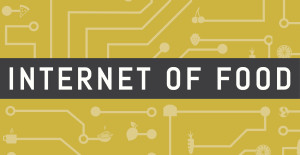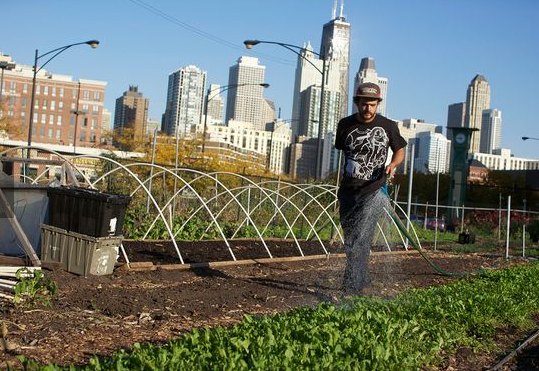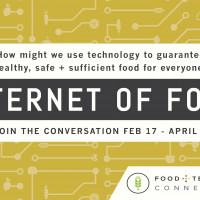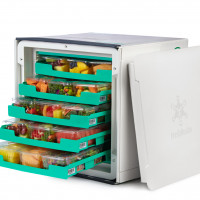Guest post by Ryan Albritton, Co-founder of Sprouthood. The views expressed here are solely those of the author and do not reflect the views of Food+Tech Connect.
Our world is urban. We are interconnected and technologically advanced yet many still struggle to find or afford fresh and healthy food. As people move back to cities and begin to reimagine post-industrial urban living, there is opportunity in our backyards.
With one in every three households in America growing food, we have the means to feed ourselves. The problem is coordination and communication. If we can reimagine individual garden plots and backyards as rows within the same urban farm, it becomes easier to see the potential cities have for more self-sufficient food production. Most gardeners are too busy outside of their gardens to worry about much more than watering and weeding, so coordinating with others on a distributed farm simply doesn’t come to mind.
Many innovative food distribution companies have already begun reimagining commercial food systems at the regional level. There are several cities across the country where one can custom-order a locally-sourced CSA share and have it delivered to their door. Restaurants can, in many places, do the same. Gardens, however, often behind fences in backyards, aren’t large enough to be planted with a full menu of crops. Instead, they are planted with the same common veggies year after year and each household ends up with a glut of some harvests and a dearth of many others. If we want to improve everyone’s access to fresh and healthy food, let’s bring some innovation to our backyards – spaces that once produced nearly half of the fresh fruits and vegetables consumed. Gardeners and urban farmers need a simple way to find each other, communicate and coordinate as co-cultivators of the same farm.
Using the tools within the Sprouthood app, gardeners can quickly see who is growing what nearby and with this information, gardens can be planted complementarily allowing neighbors to share in diverse harvests. Additionally, crop rotations can be achieved across neighborhoods, thereby improving soil quality year after year. By linking urban producers together, local food systems and communities can be made stronger. Non-gardening consumers may also use the app to offer trades for the fresh food growing around them and through these exchanges neighbors will truly come together.
At Sprouthood, we are gardeners in St. Louis who have a common dream of backyards made more powerful through coordination. We believe that more connected and coordinated gardens will help ensure access to healthy food for everyone and empower neighborhoods everywhere to grow more together.
 Internet of Food is editorial series exploring how we might use technology, new business models and design to guarantee healthy, safe and sufficient food for everyone. Join the conversation between February 17 and April 2. Share your ideas in the comments, on Twitter using#internetoffood, Facebook or LinkedIn.
Internet of Food is editorial series exploring how we might use technology, new business models and design to guarantee healthy, safe and sufficient food for everyone. Join the conversation between February 17 and April 2. Share your ideas in the comments, on Twitter using#internetoffood, Facebook or LinkedIn.
________________
 Ryan Albritton is a Co-Founder of Sprouthood, a place for gardeners to connect with others nearby to coordinate plantings, share harvests, and better plan their gardens. A veteran gardener, Ryan has experience in landscape design and installation. Prior to gardening and Sprouthood, Ryan co-founded a recording studio and record label in St. Louis called the Loud Label. You can follow Sprouthood on twitter, @sprouthood or drop us a line, seed@sprouthood.com.
Ryan Albritton is a Co-Founder of Sprouthood, a place for gardeners to connect with others nearby to coordinate plantings, share harvests, and better plan their gardens. A veteran gardener, Ryan has experience in landscape design and installation. Prior to gardening and Sprouthood, Ryan co-founded a recording studio and record label in St. Louis called the Loud Label. You can follow Sprouthood on twitter, @sprouthood or drop us a line, seed@sprouthood.com.






